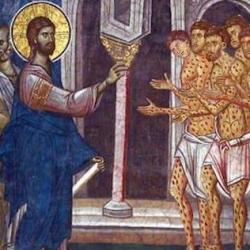Michael Guichard and Lionel Marti offer an outstanding survey of purity in ancient Mesopotamia in their contribution to Purity and the Forming of Religious Tradition. Among the many details, two particularly stand out.
The first was the connection between purity and luminosity, purity and glory. Referring to Sumerian terms for purity, they write that “a distinction might be made between an instrinsic state of purity . . . , the effect of brightness and/or of whiteness that calls for the idea of purity . . . , and the notion of ‘putting in order,’ ‘separation.’ Thus we may contrast the ‘ki-sikil,’ ‘a pure place’ that designates the virgo intacta, and the ‘kug Inana,’ ‘the bright Inana,’ famed for her erotic prowess, the latter represented foremost the morning or evening star; in a similar fashion, ‘kug’ refers to the brightness of metal, yellow . . . being used for talking about gold and white . . . the preferred term where silver is concerned” (50-51).
Some such notion is still current: Pure gold, pure white, connote not only “clean” but “bright, dazzling.” But we generally don’t equate cleanliness and brightness in quite the way that some ancient Sumerian terms did. This might in turn shed some light on biblical notions of purity.
Second, Guichard and Marti emphasize that for ancient Mesopotamians impurity is the tragic necessity of civilized life: “In its absolute meaning, purity can be seen as opposed to a cult, which is fundamentally a human endeavor. . . , and yet it is also the condition for life. We get the impression that for the Sumerians, who have written texts describing the world ‘before human beings,’ the absence of human activity s understood as a time ‘before defilement’ yet also as a time ‘before civilization,’ which is now the normal state of life. The organization of human beings, working for the gods, would thus inevitably introduce into the world both life and ‘the necessity of defilement.’ . . . existence is indeed a flaw in the impurity of nonbeing. Hence the ambiguity of the impure: it disrupts the proper order of life, but it also makes it possible” (105).
This pregnant observation offers many avenues for further reflection – on the “Gnosticism” of ancient religion, on the purity of nothingness, on the purity of the gods, on the longing of ancient humanity for deliverance from a state of being necessarily tied to impurity.











